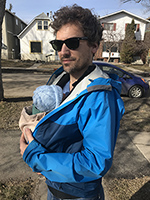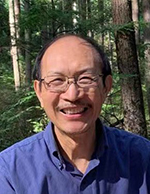 Malahat Review volunteer Sylvie Paquette talks with the Far Horizons Award for Short Fictionwinner about his story, "Naked States," which appears in our fall issue #216.
Malahat Review volunteer Sylvie Paquette talks with the Far Horizons Award for Short Fictionwinner about his story, "Naked States," which appears in our fall issue #216.
SP: How did you come up with the title and did you come up with several options before deciding on this one?
BL: “Naked States” was one of many titles I went through, and it comes from a line in the story. It also refers to the characters getting “pared down to bare,” as April feels near the end.
But my main working title was “Ch-ch-changes” which was inspired by the chorus of the David Bowie song, “Changes.” There's a line in the chorus, “Turn and face the strange,” and I think that's what the characters are doing by the end of the story. Certainly that’s what April is doing, facing the strange. Sometimes you need to get away from the noise of your own existence so you can start to observe things, so that you can listen and actually hear things on their own terms, in all their strangeness. And I think good writing often does get at that strangeness all around us, in our interactions, our sensory worlds, our language.
Read the rest of Ben Lof's interview & a story excerpt.
 Malahat Review volunteer Safiya Hopfe talks with the fall issue #216 poetry contributor about his poems, “Yin/Yang vs. Water/Fire: Lesson One in Chinese Characters,” “Getting Along: A Bilinguacultural Poem,” and “Chinglish: A Brief History of Chinese in English.”
Malahat Review volunteer Safiya Hopfe talks with the fall issue #216 poetry contributor about his poems, “Yin/Yang vs. Water/Fire: Lesson One in Chinese Characters,” “Getting Along: A Bilinguacultural Poem,” and “Chinglish: A Brief History of Chinese in English.”
SH: You said in an interview once that you tend to prefer reading and speaking in Mandarin, but writing and publishing in English. You also describe your poetry as “bilinguacultural.” These three poems in particular meditate on language’s potential and limitations in a distinct way. What does “bilinguacultural” mean to you, and how does thinking in two languages impact your creative process? Do you find the tension between the two languages limiting, expansive, or both?
YC: To me, “bilinguacultural” simply means the ability to speak two languages and function as an instrument between the two cultures they represent respectively. However, it has not been so simple for me to be such a bilinguaculturalist. Because I did not begin to learn the English alphabet until I became an ESL major in Shanghai Jiaotong University, where I was often ridiculed for my “village accent” by my teachers and classmates alike, I have always felt uneasy when I speak English; fortunately, whenever inspired to write poetry, I find this second language of mine serving me well, even better than my mother tongue. In other words, I tend to use Chinese for communication, but English for self-expression. The reason is twofold. On the one hand, though I wrote quite a lot of poetry in Chinese in my late teens, I never got a single piece published before moving to Canada as an international student; it was not until several decades later that I had my first poem accepted for publication, and that in English! Resulting from this significant encouragement, I have ever since become adapted to writing poetry in English. On the other hand, as a lifelong student and teacher of English, I have gained much more knowledge about English than about Chinese, even than many native speakers of English have, in terms of grammar, semantics, rhetoric and literature. This is certainly quite paradoxical, but my life has really been full of such paradoxes or ironies, and being an English poetry writer with a Chinese cultural personality is just one of them. Realizing many words in the two languages are not merely linguistic symbols used for human communication, but also poetic vectors of a given culture, I have developed a strong interest in exploring their linguacultural significance through poetry and, in so doing, I find the “tension” or differences between English and Chinese to be far more expansive than limiting.
Read the rest of Yuan Changming's interview & a poem.